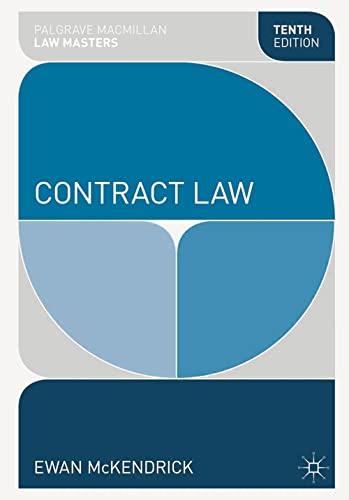Question
Years ago, Jeff incorporated Fitness, Inc. He paid $100 for 100 shares of stock and, at the same time, loaned Fitness, Inc. $60,000. Jeff elected
Years ago, Jeff incorporated Fitness, Inc. He paid $100 for 100 shares of stock and, at the same time, loaned Fitness, Inc. $60,000. Jeff elected himself, his wife, Hazel, and adult daughter, Lauren, to the Board of Directors, which in turn hired Jeff as President.
Two years after incorporation, Jeff sold 20 shares of his stock to Courtney.
After Courtney became a shareholder, Jeff, Hazel and Lauren voted to acquire 50% of the surplus inventory of Barbells, Inc., which Jeff solely owned, for the price of $50,000. The Board relied on Jeff's opinion, as owner of Barbells, Inc., that this was a fair price for the inventory. In fact, this price was greatly inflated.Jeff began gradually taking much of this inventory for his personal use without paying for it.
Also after Courtney became a shareholder, Jeff, Hazel and Lauren hired Hazel and Lauren as additional officers of the corporation and paid them a salary sufficient to ensure that there would be no profits remaining to pay as dividends to Courtney.
In order to fund the purchase of the surplus inventory of Barbells, Inc., Fitness, Inc. took out an unsecured loan from Chase Bank for $30,000. Two days before the Chase Bank loan was due to be paid back, Fitness, Inc. repaid the $60,000 loan from Jeff. This left Fitness, Inc. with only $5,000 in total assets.
Chase Bank filed a lawsuit against both Fitness, Inc. and Jeff, seeking to recover its $30,000 loan. Courtney filed a derivative action against Jeff, Hazel and Lauren, alleging that the directors had breached their duty of care to Fitness, Inc. when it acquired the surplus inventory of Barbells, Inc. Courtney also alleged that Jeff and the Board had oppressed her as a minority shareholder of the corporation. The directors filed a motion for summary judgment in Courtney's lawsuit, claiming that their decisions were protected by the business judgment rule.
- On what theory can Chase Bank sue Jeff personally for the loan that it made to Fitness, Inc.? Is Chase Bank likely to prevail? Why or why not? [20 points]
- Did Jeff, Hazel and Lauren breach their fiduciary duties to the corporation and to Courtney? Which duties and why? Were the decisions of the Board protected by the business judgment rule? Why or why not? [30 points]
Step by Step Solution
There are 3 Steps involved in it
Step: 1

Get Instant Access to Expert-Tailored Solutions
See step-by-step solutions with expert insights and AI powered tools for academic success
Step: 2

Step: 3

Ace Your Homework with AI
Get the answers you need in no time with our AI-driven, step-by-step assistance
Get Started


